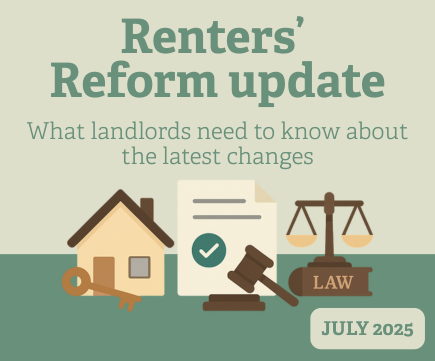Renters’ Reform update: What landlords need to know about the latest changes
The Renters' Rights Bill has taken a major step forward, with several key amendments now passed that aim to create a more balanced rental market. At Hat and Home, we’re keeping a close eye on developments to make sure landlords stay informed and protected through every stage of reform.
Here’s everything you need to know about what’s changed — and what’s coming next.
Where are we now?
The Renters' Rights Bill has just completed its crucial Report Stage in the House of Lords, introducing several significant changes for landlords and letting agents. The Third Reading is now complete as of 21 July 2025.
We’ve also had confirmation that the final stages in the House of Commons will begin on 8 September 2025, which means the Bill won’t become law until autumn at the earliest.
Practical changes that work for landlords
? Pet damage deposits approved
In a welcome move, landlords can now request an additional three weeks' rent as a pet damage deposit, replacing the previously suggested (and impractical) requirement for tenants to take out pet insurance.
This strikes a better balance — giving landlords meaningful protection, while making pet ownership more accessible for tenants.
? Student landlord protections strengthened
A crucial amendment allows landlords of one- and two-bedroom student properties to regain possession to prepare for the next academic year.
This helps maintain the stability of student lettings, ensuring landlords aren’t penalised by changes to fixed-term agreements.
? Tribunal capacity review – A step toward faster decisions
The government is now required to review tribunal capacity, following concerns about delays in rent dispute cases.
This is an important safeguard for landlords, ensuring lawful rent adjustments can proceed without being caught in a backlog.
? Reduced re-letting ban for failed sales
Originally, if a landlord gave notice to sell but didn’t complete the sale, they faced a 12-month ban on re-letting. That’s now been halved to six months, as long as evidence of genuine marketing is provided.
This adds much-needed flexibility and helps reduce unnecessary void periods.
? Clarity for letting agents through assured advice
Letting agents will now have access to assured, consistent guidance via the Primary Authority scheme under the Tenant Fees Act.
For landlords, this means greater confidence that your agents are working to clearly defined, professional standards — with less confusion from regional differences.
? Joint tenancies – More flexibility for all parties
Landlords, tenants, and co-tenants can now mutually agree to withdraw notice to quit in a joint tenancy. This gives everyone more control and flexibility, especially in changing personal circumstances.
Continued advocacy and monitoring
Further discussion in Parliament is expected soon, particularly around court capacity — a concern shared by many landlords. Fortunately, the Bill now includes a requirement for formal post-legislative reviews, which will assess its long-term impact on housing, repossession, and court processes.
A balanced step forward
These latest amendments show real progress in creating reforms that work for landlords while also strengthening tenant rights. The changes acknowledge the vital role landlords play in the housing market and reflect the input of industry advocates like Propertymark, our professional membership body.
Need Advice? We're Here to Help
At Hat and Home, we’re committed to helping landlords stay ahead of change with clear advice, proactive management, and tailored support.
Have questions about what these changes mean for you? Get in touch today!

